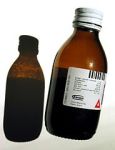I was never a great math student. Maybe that’s why I became a writer. I may have struggled with pre-calculus, however, math literacy was not an issue.
I was never a great math student. Maybe that’s why I became a writer. I may have struggled with pre-calculus, however, math literacy was not an issue.

In this study of parents with children under age 8, those with third grade math skills or below were five times more likely to measure the wrong dose of medication for their child than those with skills at the sixth grade level or higher.
H. Shonna Yin, M.D., M.S., FAAP, assistant professor of pediatrics, New York University School of Medicine and Bellevue Hospital Center and a co-author of the study said that various measurements for liquid dosing, such as milliliters, teaspoons and tablespoons can often be confusing.
“Parents may need to understand numerical concepts such as how to convert between different units of measurement, like milliliters, teaspoons and tablespoons. Parents also must accurately use dosing cups, droppers and syringes, many of which vary in their measurement markings and the volume they hold.”
We often hear about health literacy being associated with medicinal errors. Many of us never think about the impact of math skills on health. In this study, reading and math skills of the 289 participating parents were assessed several times. Then the parents were observed as they measured out a prescribed dose of liquid medication.
Forty one percent made a dosing error. Low math scores in particular were associated with measuring mistakes, especially in those adults with very poor numeracy.
Clearly there need to be coping strategies developed for these parents, and others that struggle with both reading and math skills. Medication errors in children are a serious problem, and can lead to permanent disability or death. Many adults, unfortunately, are embarrassed to admit they don’t understand.
Health providers should use office visits as an opportunity to assess and help educate parents – “For example, having providers review and give parents pictures of dosing instruments filled to the correct amount for that prescription may be beneficial,” said Dr. Yin.
This is also a smart strategy to incorporate into prenatal visits or classes for expectant parents, as well as other forms of public health education.
Mistakes happen. But when it’s your child’s health on the line there is no margin for error. If you are unclear about any medication prescribed for your child, don’t guess.
Ask your doctor, nurse practitioner or pharmacist to explain, until you absolutely understand what to do. Always double check that the correct prescription was filled when you pick it up at the drugstore. Even if your math skills are fine, double check anyway. Your child’s life may depend on it.
